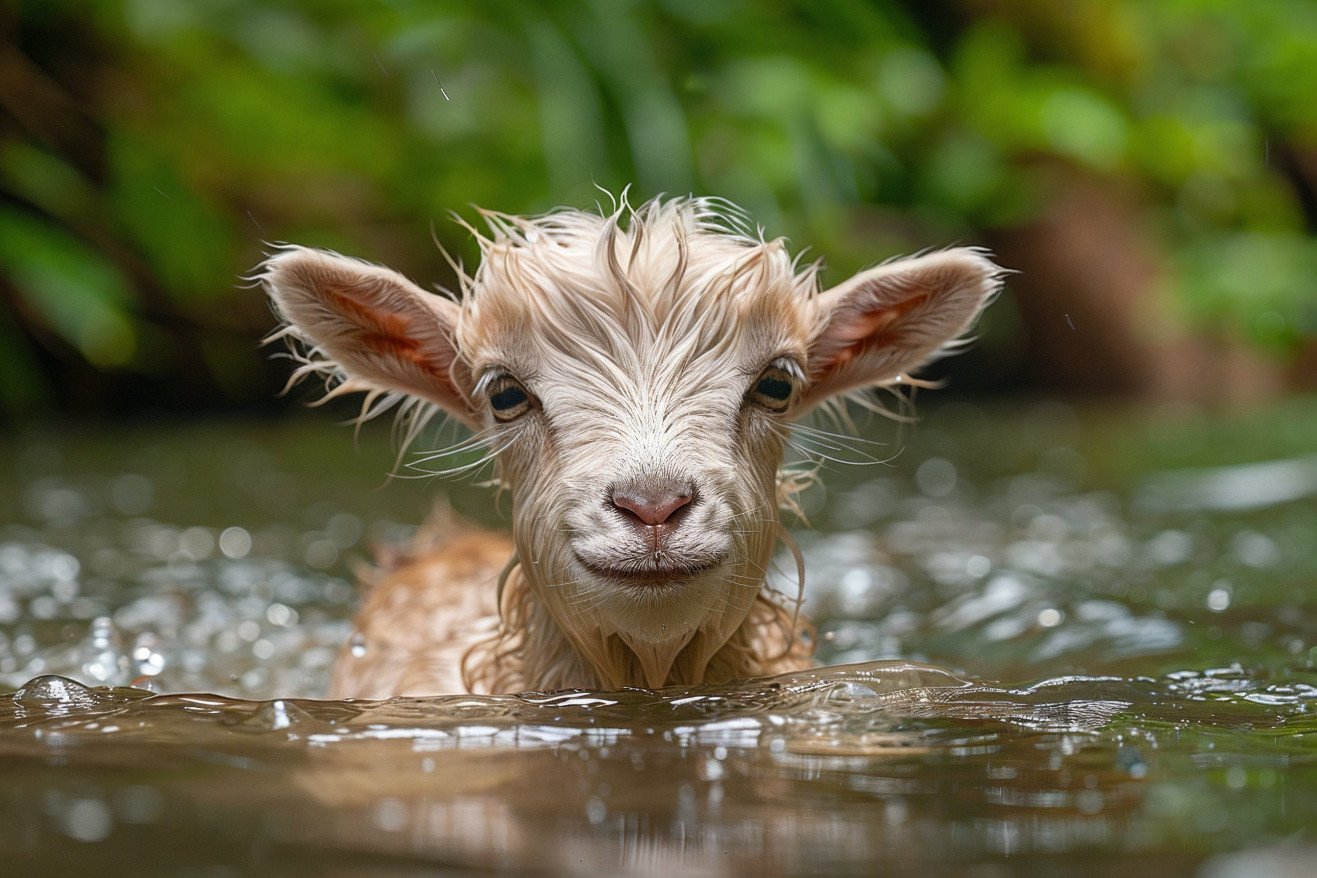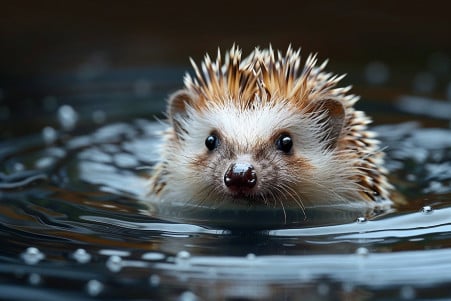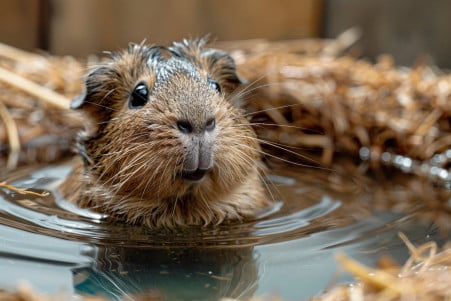Can Goats Swim? The Surprising Truth About Their Aquatic Prowess
13 April 2024 • Updated 11 April 2024

Whether you've seen them in a pasture or on a mountainside, you probably don't think of goats as swimmers, but can goats swim? They can, and they're actually quite good at it. Goats have a hollow hair coat that makes them buoyant, and their long, lean muscles and strong hooves help them move through the water and get back on land. As a result, many domestic and wild goats will swim in ponds, lakes, and even oceans to find new food sources.
In this article, we'll cover the observations and research that animal behaviorists, veterinarians, and wildlife biologists have conducted on goat swimming in a variety of settings. We'll also look at the special physical adaptations and instincts that have helped goats become successful swimmers, and in doing so, we'll learn about the fascinating evolutionary adaptations of these often overlooked animals. Finally, we'll cover the real-world implications of goat swimming in agriculture, conservation, and more.
Can Goats Swim?
Why Do Goats Swim and What Are the Benefits?
Goats are not natural swimmers, as swimming is a physical activity that requires a level of endurance and muscle development that most domestic goats do not have, notes Backyard Goats. That said, there are times when swimming may be a necessity, such as when goats need to reach new food sources, escape predators, or deal with parasites or other health issues.
Some goat owners may encourage swimming in a controlled setting to help goats get exercise, to enrich their lives, or to prevent muscle dystrophy due to lack of movement. In the words of a farmer quoted by Quackplex, "You'd be surprised. I've seen my goats take to water naturally, almost like they knew what they were doing instinctively."
A goat's breed, past experiences with water, and personality can all play a role in how good and how willing a goat is to swim. While there are plenty of adorable videos of goats swimming on the internet, Backyard Goats warns that owners should be cautious of potential issues like exposure to chlorine and make sure that goats have a way to get out of pools or other bodies of water. It's important to make sure that goats are supervised and that their swimming is controlled.
How Often and Under What Conditions Do Goats Swim?
While goats have the physical capability to swim, how often they do so and the conditions under which they swim can vary widely based on the environment and the individual goat. According to a forum post on The Goat Spot, goats can swim, but the post doesn't offer any insight into how often they do so.
Wild and feral goats are more likely to swim on a regular basis to reach new grazing areas or to move between islands. As noted by a blogger on Kri Kri Hunt, "Wild goats and kri kri ibex will swim to get to new grazing areas, even if that requires swimming." Domesticated goats, however, may only swim occasionally, and then usually by accident or if they have no other way to cross a body of water.
Some goat owners have shared stories of their goats swimming across ponds or bayous, sometimes seemingly out of curiosity and sometimes out of necessity. One user on the Backyard Herds forum wrote that their young buck followed them into a pond when they called him, even though he hadn't swum there before. The depth, width, and current of the water, as well as the presence of obstacles or predators, can all play a role in whether a goat will swim.
Domestic vs. Wild Goat Swimming Abilities
Although goats in general can swim, there are some differences in swimming ability between domesticated and wild goats. Research on the physiological adaptations of goats in harsh environments indicates that goats that are wild or feral in island or coastal environments are generally better swimmers than their domesticated relatives.
The need to find new food sources or move between islands has led to wild and feral goats evolving stronger swimming skills over time. As one Quackplex author notes, "You'd be surprised. I've seen my goats take to water naturally, almost like they knew what they were doing instinctively."
On the other hand, while domesticated goats can swim, they may not be as strong or skilled swimmers as their wild relatives. Research on the genetic origins of livestock indicates that a goat's swimming ability can be influenced by factors like muscle mass, body density, and coat type, with wild goats potentially having more favorable characteristics.
A goat's swimming ability, whether it's domesticated or wild, can also be affected by its individual personality and past experiences. As one Quackplex author points out, goats that are younger and have more exposure to water are less likely to be afraid of swimming, which suggests that a goat's comfort with swimming may be just as much about familiarity and learned behavior as physical traits.
Safety Concerns of Swimming Goats
Goats are not natural swimmers and can drown if they get in over their heads or become fatigued in the water, notes the Penn State Extension. Other potential hazards include entanglement in underwater debris, being carried away by currents, and exposure to pool chemicals like chlorine, notes the Humane Society of the United States.
If goats are going to be allowed to swim, they need to be closely monitored and the swimming area needs to be shallow and calm, with no deep or fast-moving water. The Penn State Extension recommends making sure the goats have a way to get out of the water that they can easily access, like a ramp or gently sloping shore, so they don't get stuck.
In addition, goats can pose a danger to people, especially during breeding season when male goats can become aggressive, and their horns can cause injury, according to the Olympic National Park. Proper handling and personal protective equipment should be used when working with swimming goats.
Real-World Applications and Safety Concerns of Goat Swimming
Controlled swimming can be a form of exercise and mental stimulation for domesticated goats, which can help prevent muscle dystrophy due to lack of movement, notes Backyard Goats. In agricultural or conservation contexts, knowledge of goats' swimming capabilities could be helpful in terms of managing where goats graze or controlling invasive species on islands.
That said, goat owners need to be mindful of potential dangers such as exposure to chlorine and ensure that goats have a way to get out of pools or other bodies of water, cautions the Humane Society of the United States. Goats should be handled with care and protective gear should be worn when working with them, as they can become violent and cause harm, notes the Penn State Extension.
It is recommended that goat owners talk to a veterinarian or someone who has experience handling goats before making swimming a regular part of domesticated goats' lives, notes the Olympic National Park. By understanding the real-world applications and safety concerns, goat owners can make sure that swimming is a responsible part of how they care for and stimulate their goats.
Conclusion: Understanding Goats' Surprising Swimming Skills
Although goats aren't typically known for their swimming abilities, their surprising capacity for swimming has helped them survive and thrive in a wide range of environments. Their unique physical characteristics, including their buoyant coats and strong hooves, have made it possible for them to cross bodies of water to find food. Both wild and domesticated goats swim, but how often and under what circumstances depends on a number of factors, including the goats themselves.
While understanding goats' swimming abilities can be useful in farming, conservation, and even in providing enrichment for domesticated goats, it's important to remember that goats should be supervised when they swim and that they should be handled with care. This will help ensure the safety and well-being of the goats and the people who care for them.


